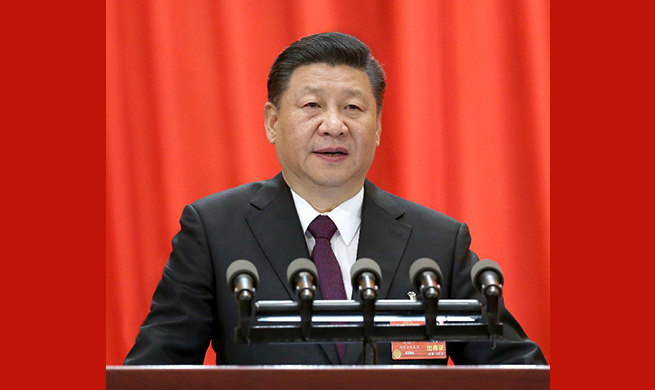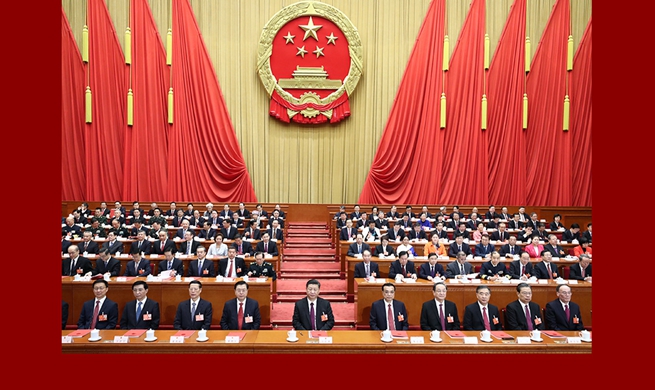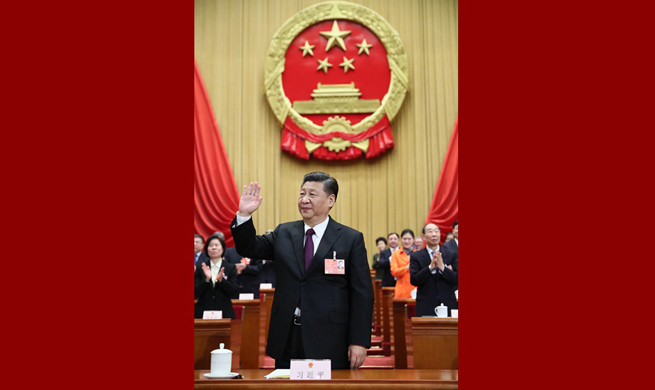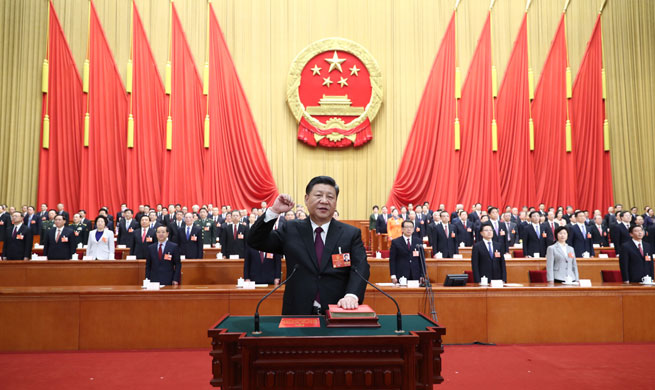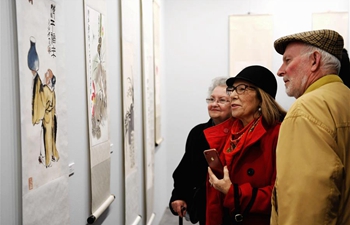BUENOS AIRES, March 22 (Xinhua) -- G20 finance ministers and central bank governors met here earlier this week to discuss ways to boost economic growth, as impending U.S. import tariffs on steel and aluminum cast a pall over the gathering.
Most ministers agreed that the tariffs, set to take effect on Friday, fly in the face of the central tenet of today's developed and emerging economies that protectionist measures only inhibit trade and growth.
IN DEFENSE OF FREE TRADE
"I am deeply concerned that the foundation of our prosperity and free trade is under threat," said German Finance Minister Olaf Scholz. "Protectionism is not the answer to the difficulties of our time. The situation is serious."
Spanish Economy Minister Roman Escolano echoed that sentiment when speaking to reporters at the close of the two-day meeting on Tuesday.
"The vast majority of participants share our opinion that protectionism is a great historical error, and that the international community must maintain its confidence in the multilateral order, which it has taken us many years to establish," Escolano said.
U.S. President Donald Trump previously announced a steep 25-percent tariff on steel and a 10-percent one on aluminum to protect national industry.
Instead of opting for such a heavy-handed anti-trade move, the United States should have tried to air its concerns "in the multilateral arena of the World Trade Organization (WTO), not within the framework of unilateral measures," said Escolano.
Referring to a joint communique issued at the end of the G20 meeting, Escolano said: "Spain joins the European Union and many other participating countries in a very important message of concern and rejection of any protectionist escalation due to these measures."
Spain is betting on "economic opening up" and boosting trade with Latin America to drive economic growth, he said.
Likewise, Zhou Xiaochuan, head of China's delegation to the G20 meeting, said China will continue to support multilateralism and to strengthen cooperation with all parties in opening up.
He pointed out that at previous meetings, especially during the time of the financial crisis, the biggest threat to the world economy came from financial or fiscal risks, but this year trade protectionism emerged as the single biggest concern for G20 members and posed as a major risk to global economic growth.
RISKS OF TRADE WAR
Despite the obvious consensus on the dangers of applying drastic protectionist measures, the United States appeared undeterred.
U.S. Treasury Secretary Steven Mnuchin admitted "there is always a risk, if we apply tariffs, that others will respond, and there is a risk of a trade war."
However, the United States is "not afraid" of sparking a trade war, though he added that was not the objective.
The U.S. official denied the tariffs were a protectionist measure, but at the same time said they were justified to combat "unfair practices" by some countries.
WTO Director-General Roberto Azevedo earlier warned of the potential "domino effect" of U.S. tariffs.
Azevedo said "this escalation, which I say has a domino effect, is an escalation that is tough to reverse."
"Once you enter the path of reciprocal reprisals, you know when it begins, you know how it begins, but you don't know how or when you will be able to stop the process," said Azevedo.
"Unilateral" announcements like those made by Trump tend to spark counter measures, said Azevedo.
"This process of action and reaction, sometimes, leads to trade wars that are not in anyone's interests, where there are only losers," he warned.
Managing Director of the International Monetary Fund (IMF) Christine Lagarde also warned countries to avoid a trade war and "work constructively together to reduce trade barriers and resolve trade disagreements."
In the lead-up to the Buenos Aires meeting, Lagarde directly countered Trump's assertion that "trade wars are good, and easy to win."
"Economic history clearly shows that trade wars not only hurt global growth, but they are also unwinnable," said Lagarde.
While the G20 joint communique opened on an upbeat note, it quickly went on to acknowledge existing obstacles to growth.
"The global economic outlook has continued to improve since we last met in October 2017," however, "challenges remain to raise growth and make it more inclusive," the statement said.
The document identified "heightened economic and geopolitical tensions" as "key risks to the outlook," and asserted that "international trade and investment are important engines of growth, productivity, innovation, job creation and development."
A LOSE-LOSE PROPOSITION
Countries in Latin America have expressed deep concerns about Trump's decision to impose tariffs and sought exemptions ahead of the negotiation deadline on Friday.
Several of the United States' main regional trade partners, including Mexico, Brazil and G20 host Argentina, lobbied to have their imports exempted from the tariffs.
Brazilian President Michel Temer has said he prefers an amicable resolution to the issue, but could ultimately appeal the decision at the WTO.
Experts believe that the recent U.S. tariff measure is only a tip of the iceberg in the looming trend of anti-globalization.
The United States may be acting in its own short-term interests, but showing a lack of vision that could potentially backfire on itself, as well as hamper world trade, according to Argentine economist Ricardo Arriazu.
"Protectionist measures can unleash trade wars of different dimensions instead of protecting certain sectors, ending up impoverishing the nations involved," said Arriazu.
Europe has already announced it will respond to the tariffs by slapping import duties on a greater number of U.S. products, he noted.
"The United States should not lose sight of the fact that given the size of its economy, its measures significantly affect the entire global economy, and that changes in the global economic structure can lead other countries to trade among each other, leaving (the United States) isolated," said Arriazu.










